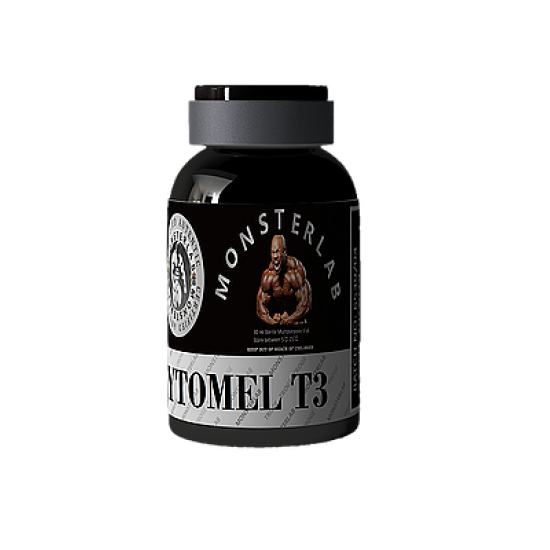Cytomel 100




- Stock: In Stock
- Model: Cytomel
Available Options
Product Info CYTOMEL 100
ALTERNATIVE STEROID NAMES: Tertroxin, Cytomel, Ro-Thyronine, Cytomel tabs, Sanabo, Tertroxin, Linomel, Thyrotardin, Tiromel ACTIVE SUBSTANCE: Liothyronine Sodium 100mcg/ml 100 ml or 50 ml Strength Gains: Mass & Weight Gains: Fat Burning: @@@@@@@@ Cutting/Definition: @@@@@@@@@ Side Effects: @@@@@@@@ Ability to keep Gains: @ Usual dosages: 25 - 100 mcg per day Detection time: NA Best combined with: Bulking: HGH (rarely used for bulking). Cutting: Clenbuterol, HGH Beginner Use: @@@@@@ Female Use: @@@@@@@@ Pros: Cheap, effective fat burner. Cons: Potentially dangerous when used for a long time. Pharmaceutical Name: liothyronine sodium
Chemical Structure: tri-iodio-thyronine (T3)
Molecular weight of base: 650.9776
Effective Dose: 25-100 mcg / day orally
What is liothyronine?
Liothyronine is a man-made form of a hormone that is normally produced by your thyroid gland to regulate the body's energy and metabolism. Liothyronine is given when the thyroid does not produce enough of this hormone on its own.
Liothyronine treats hypothyroidism (low thyroid hormone). Liothyronine is also used to treat or prevent goiter (enlarged thyroid gland), and is also given as part of a medical tests for thyroid disorders.
Liothyronine should not be used to treat obesity or weight problems.
Liothyronine may also be used for purposes not listed in this medication guide.
What is the most important information I should know about liothyronine?
Since thyroid hormone occurs naturally in the body, almost anyone can take liothyronine. However, you may not be able to use this medication if you have a thyroid disorder called thyrotoxicosis, or an adrenal gland problem that is not controlled by treatment.
Before taking liothyronine, tell your doctor if you have heart disease, angina (chest pain), coronary artery disease, congestive heart failure, diabetes, or problems with your pituitary or adrenal glands.
Tell your doctor if you are pregnant or breast-feeding.
To be sure this medication is helping your condition, your blood may need to be tested often. Visit your doctor regularly.
Keep using this medicine as directed, even if you feel well. You may need to take thyroid medication for the rest of your life.
Call your doctor if you notice any signs of thyroid toxicity, such as chest pain, fast or pounding heartbeats, feeling hot or nervous, or sweating more than usual.
What should I discuss with my healthcare provider before taking liothyronine?
Since thyroid hormone occurs naturally in the body, almost anyone can take liothyronine. However, you may not be able to use this medication if you have a thyroid disorder called thyrotoxicosis, or an adrenal gland problem that is not controlled by treatment.
To make sure you can safely take liothyronine, tell your doctor if you have any of these other conditions:
heart disease, angina (chest pain);
coronary artery disease;
congestive heart failure;
any type of diabetes; or
problems with your pituitary or adrenal gland.
FDA pregnancy category A. Liothyronine is not expected to harm an unborn baby. However, tell your doctor if you become pregnant, since your dose needs may be different during pregnancy.
Small amounts of liothyronine can pass into breast milk, but this is not expected to harm a nursing baby. However, do not use this medication without telling your doctor if you are breast-feeding a baby.
How should I take liothyronine?
Take exactly as prescribed by your doctor. Do not take in larger or smaller amounts or for longer than recommended. Follow the directions on your prescription label.
Liothyronine is usually taken once daily. Follow your doctor's instructions.
Your doctor may occasionally change your dose to make sure you get the best results.
If you are switching to liothyronine from any other thyroid medication, stop using the other medication before you start taking liothyronine.
To be sure this medication is helping your condition, your blood may need to be tested often. Visit your doctor regularly.
Keep using this medicine as directed, even if you feel well. You may need to take thyroid medication for the rest of your life.
Call your doctor if you notice any signs of thyroid toxicity, such as chest pain, fast or pounding heartbeats, feeling hot or nervous, or sweating more than usual.
If you need surgery, tell the surgeon ahead of time that you are using liothyronine. You may need to stop using the medicine for a short time.
Store at room temperature away from moisture and heat.
What happens if I miss a dose?
Take the missed dose as soon as you remember. Skip the missed dose if it is almost time for your next scheduled dose. Do not take extra medicine to make up the missed dose.
What happens if I overdose?
Seek emergency medical attention or call the Poison Help line at 1-800-222-1222.
Overdose symptoms may include headache, sweating, diarrhea, irregular menstrual periods, confusion, weakness, swelling in your hands or feet, fast heart rate, chest pain, feeling short of breath, fainting, or feeling nervous, restless, or irritable.
What should I avoid while taking liothyronine?
Do not change brands or change to a generic product without first asking your doctor. Different brands of liothyronine may not work the same. If you get a prescription refill and your new pills look different, talk with your pharmacist or doctor.
If you also take cholestyramine (Prevalite, Questran) or colestipol (Colestid), avoid taking these medications within 4 hours before or after you take liothyronine.
Liothyronine side effects
Get emergency medical help if you have any of these signs of an allergic reaction: hives; difficult breathing; swelling of your face, lips, tongue, or throat.
Less serious side effects may include temporary hair loss (especially in children).
Liothyronine Dosing Information
Usual Adult Dose for Hypothyroidism:
Initial dose: 25 mcg orally once a day; may be increased by up to 25 mcg every 1 to 2 weeks depending on the patient's clinical response and laboratory findings
Maintenance dose: 25 to 75 mcg dailyUsual Adult Dose for Myxedema:
Initial dose: 5 mcg orally once a day; may be increased by 5 to 10 mcg every 1 to 2 weeks depending on the patient's clinical response and laboratory findings
When treatment is up to 25 mcg/day, the dosage may be increased by 5 to 25 mcg every week or two until a satisfactory therapeutic response is attained.
Maintenance dose: 50 to 100 mcg dailyUsual Adult Dose for Myxedema Coma:
25 to 50 mcg intravenously
If the patient has known or suspected cardiovascular disease, then an initial dose of 10 to 20 mcg in conjunction with cardiac monitoring is recommended.
Subsequent doses should be determined by the patient's clinical condition and response to treatment. Generally, doses should be administered at least 4 hours and no more than 12 hours apart. Caution is advised in adjusting the dose due to the potential of acute and large changes to precipitate adverse cardiovascular events.
Available clinical data indicate reduced mortality in patients receiving at least 65 mcg/day in the initial days of treatment. However, there is limited clinical experience with dosages above 100 mcg/day.
Oral thyroid hormone therapy should be substituted as soon as the patient is stable and able to take oral medication. If levothyroxine rather than liothyronine is used, the prescriber should bear in mind that there is a delay of several days in the onset of levothyroxine activity and that intravenous therapy should be discontinued gradually.Usual Adult Dose for Thyroid Suppression Test:
75 to 100 mcg orally once a day for 7 days
Radioactive (131) iodine uptake should be determined before and after the administration of thyroid hormone. If thyroid function is under normal control, the radioactive iodine uptake should drop significantly after treatment. A 50% or greater suppression of uptake indicates a normal thyroid-pituitary axis and rules out thyroid gland autonomy.
Liothyronine should be administered cautiously if there is a strong suspicion of thyroid gland autonomy, as exogenous hormone effects will be additive to those of the endogenous source.Usual Adult Dose for TSH Suppression:
Initial dose: 5 mcg orally once a day; may be increased by 5 to 10 mcg every 1 to 2 weeks depending on the patient's clinical response and laboratory findings
When treatment is up to 25 mcg/day, the dosage may be increased by 12.5 to 25 mcg every week or two until a satisfactory therapeutic response is attained.
Maintenance dose: 75 mcg dailyUsual Pediatric Dose for Hypothyroidism:
Congenital hypothyroidism/Hypothyroidism:
Infants and Children less than or equal to 3 years:
Initial dose: 5 mcg orally once a day; may be increased by 5 mcg every 3 days to a maximum dosage of 20 mcg/day for infants and 50 mcg/day for children 1 to 3 years of age.
Hypothyroidism:
Initial dose: Children: 5 mcg orally once a day. Increase in 5 mcg/day increments every 3 to 4 days
Usual maintenance dose:
Infants: 20 mcg orally once a day
Children 1 to 3 years: 50 mcg orally once a day
Children greater than 3 years: Full adult dosage may be necessary
Goiter (nontoxic):
Children:
Initial dose: 5 mcg orally once a day. Increase in 5 mcg/day increments every 1 to 2 weeks
Maintenance dose: 15 to 20 mcg orally once a day
Goiter (nontoxic):
Children: 5 mcg orally once a day. Increase in 5 mcg/day increments every 1 to 2 weeks
Maintenance dose 15 to 20 mcg orally once a dayWhat other drugs will affect liothyronine?
Tell your doctor about all other medicines you use, especially:
birth control pills or hormone replacement therapy;
a blood thinner such as warfarin (Coumadin);
digoxin (digitalis, Lanoxin);
epinephrine (EpiPen) or norepinephrine (Levophed);
insulin or oral diabetes medication;
medications that contain iodine (such as I-131);
an antidepressant such as amitriptyline (Elavil, Vanatrip), doxepin (Sinequan), desipramine (Norpramin), imipramine (Janimine, Tofranil), nortriptyline (Pamelor), and others;
salicylates such as aspirin, Backache Relief Extra Strength, Novasal, Nuprin Backache Caplet, Doan's Pills Extra Strength, Pepto-Bismol, Tricosal, and others;
steroids such as prednisone and others.
This list is not complete and other drugs may interact with liothyronine. Tel your doctor about all medications you use. This includes prescription, over-the-counter, vitamin, and herbal products. Do not start a new medication without telling your doctor.
Where can I get more information?




